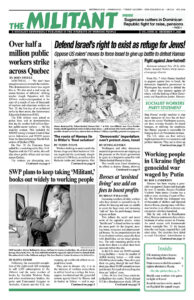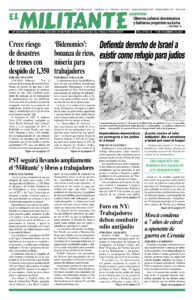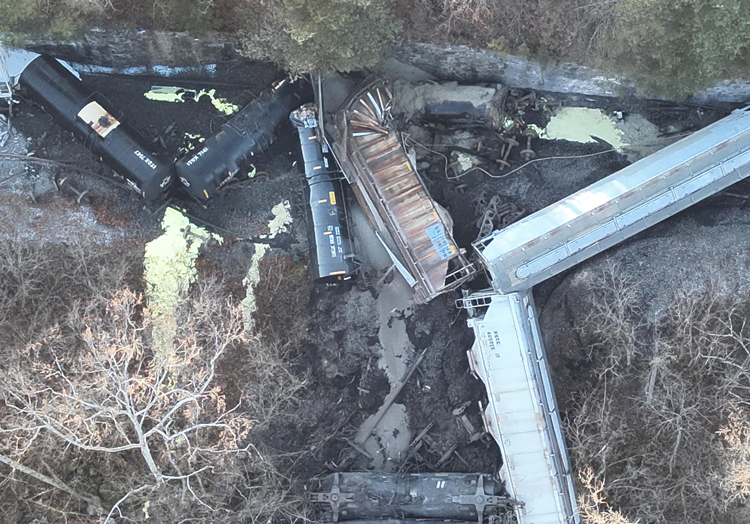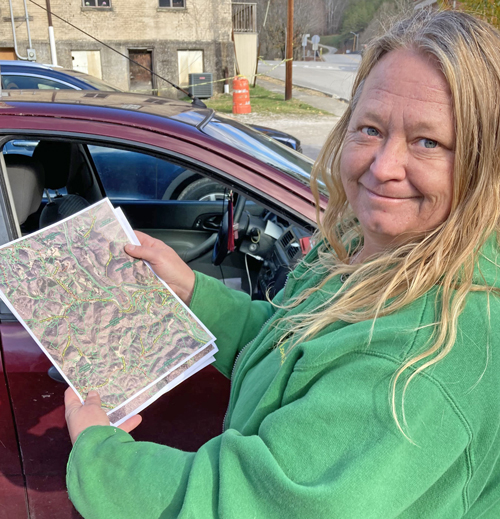LIVINGSTON, Ky. — Residents in this central Kentucky town of 200 were told to evacuate Nov. 22 after 16 cars on a CSX freight train carrying hazardous chemicals derailed just north of here. Two of the cars were transporting molten sulfur, which caught fire as at least one of them was breached. The fire released sulfur dioxide into the air, which can be deadly at high concentrations.
“Someone came and was banging on our door the night before Thanksgiving telling us to get out,” Linda Todd, who lives in an apartment complex in town, told the Militant.
“We said, ‘We can’t leave, we have turkeys in the oven!’ But when I went outside my tongue and mouth started burning from the fumes,” she said. “Some people I talked to had trouble breathing.”
One member of the train’s two-person crew was treated for injuries, the company said. Another two of the derailed cars were carrying magnesium hydroxide, a mildly hazardous chemical, but those cars weren’t breached. CSX bosses reported four days later that “officials have determined that a failed wheel bearing caused the derailment.”
The rail bosses reported they were going to remove all the spilled material, as well as any contaminated ballast or soil before rebuilding the tracks. This was an important issue in the Feb. 3 Norfolk Southern derailment, spill and toxic fire in East Palestine, Ohio. Norfolk Southern bosses rebuilt the tracks and ran trains right on top of badly contaminated ground. Only a public outcry forced them to reverse themselves and start a cleanup.
By Nov. 26 CSX said the cleanup and removal of all the rail cars and 2,500 tons of impacted soil was complete, the tracks were being repaired, and trains would be running again shortly. They also claimed the air quality was acceptable and residents had been cleared to return home.
CSX set up an “Outreach Center” at the Old Livingston Gymnasium downtown to distribute checks to some of those evacuated. “They call it ‘evacuation inconvenience money,’” Todd said. “It’s on top of having our motel rooms and food paid for. But I wonder why we got these checks so fast?”
Todd fell and was injured on her face and chin in the commotion of the evacuation. She received a check for more than $2,000. “They gave me an extra $255 compensation because I got hurt,” she said. “We had to sign some papers but we never got copies of them. Who knows what’s coming down the road? They just say everything is OK but it seems like they might be worried about lawsuits.”
Todd’s sister, Cindy Bradley, confirmed that those who were compensated all got $2,000 or more. “But people are having trouble cashing the checks because a lot of people don’t have bank accounts,” she said. “One of the local banks says they ran out of money and they’re telling people to just deposit them instead.”
Not everyone who evacuated received compensation. Evelyn Scalf was at work at the Marathon gas station the afternoon of the derailment when she noticed a lot of people from CSX coming in. “I asked what was going on and they said they couldn’t tell us,” she said. “When I finally found out I decided to go home and get my family out. My son and his wife and babies all live close to the derailment but they had not been evacuated. I got all my kids and grandkids and told some neighbors too and we all left.”
Scalf and her family were outside the CSX Outreach Center after being told they didn’t qualify for assistance because their home was not within the designated area within which CSX had decided to give assistance. Scalf’s daughter, Elizabeth Clines, said her nephew, a baby on her lap, has been coughing ever since the derailment. “We didn’t get any help,” she said.
Clines and Scalf said that jobs were hard to come by in the area and many people depend on hunting and fishing for a significant part of their food. “I asked the CSX representative in the center what about the wildlife? He just said, ‘What’s your address?’ He didn’t want to answer me,” Scalf said.
“I don’t trust them,” she added. “They just want to quiet people down and get their trains running again.”
Bradley said she was contacted by a woman from East Palestine after she was interviewed by a local TV station. “She asked how things are going for us,” Bradley said, “and she wanted us to know they’ve had to fight for everything they got from Norfolk Southern after the derailment and toxic chemical contamination there.”



